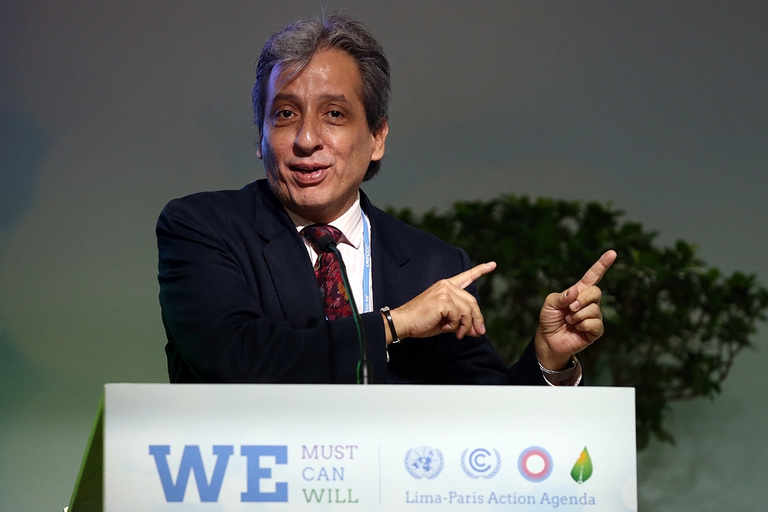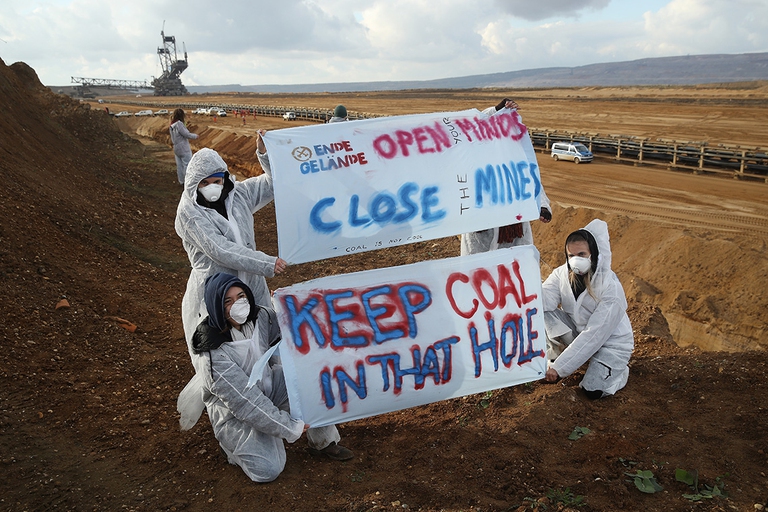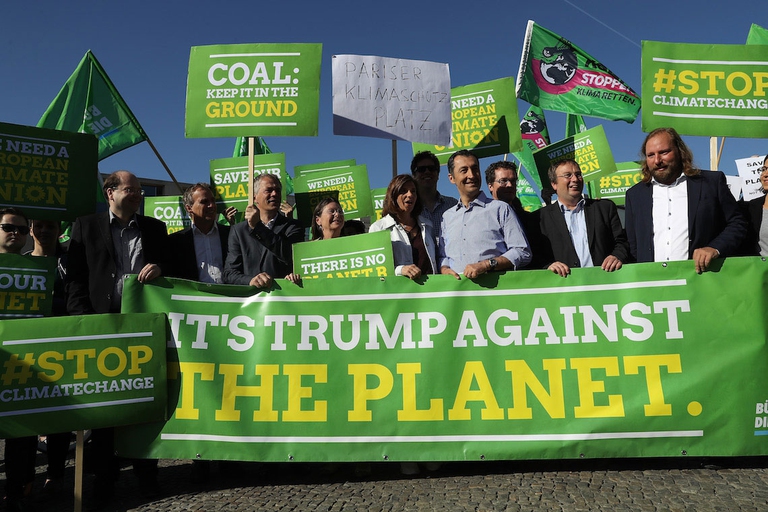
A group of experts in Tokyo suggested pouring radioactive water from Fukushima into the open sea. A marine biochemist explains the consequences of this absurd decision.
The WWF is among the organisations that have been fighting the most for the phase out of coal as a source of energy. We asked Manuel Pulgar-Vidal, responsible for the Climate and Energy campaign, about the International Alliance for the Phasing out of Coal.
Manuel Pulgar-Vidal was president of the COP20 United Nations conference on climate change, which was held in Lima in 2014, and he’s also the former Peruvian Minister of the Environment. Now he’s responsible for WWF International’s Climate and Energy campaign, appointed by Marco Lambertini, current director of the organisation. Pulgar-Vidal contributed to the launch of the Powering Past Coal Alliance during the COP23, which brings together 20 countries who have committed to phasing out coal by 2030. We met him in Bonn, Germany, during the last day of negotiations to try and understand why it’s still so difficult to abandon the most polluting fossil fuel – even though everyone knows it’s the only right thing to do.
During the COP23 the international alliance for the phasing out of coal by 2030 was presented. You and the WWF welcomed the news. In fact, the WWF has been fighting for its abolition by 2025 for a while. Are you optimistic about this new development?
Sure. The High ambition coalition plus many other countries have set a clear deadline to phase out coal: it’s a great message to the world. It is fruit of political will but also a request put forward by people. On Saturday, just before the starting day of the COP, we had 25,000 people on the streets of Bonn saying “end coal now”. It is clear that we can’t move forward if we’re still relying on coal, on its extraction and importation, and on its use as a source of energy. A message from many countries, including the UK, Canada, Mexico, to end coal is a good message to the world. It means facing what is the current political threat coming mostly from the US, because Trump thinks that the US should go back to coal facilities, trying to journey to the past. Today there are great opportunities for renewable energies but also if we wish to close the gap by ending coal. In this COP I’ve used this phrase more than once: you can’t fight alcoholism with more alcohol. You can’t combat climate change with more coal. This is the first step, which needs to have a deadline and then to be followed by others.
#COP23, the gathering of world climate leaders, is over. Now it’s time to connect the dots. WWF’s @manupulgarvidal on what we hoped to see in Bonn, and what happens next:https://t.co/G0sUUWinvi
— WWF (@WWF) 23 novembre 2017
Gradually we should put in place all the possible solutions, we need to combine this powerful message with specific measures, for example strengthening and putting more effort in the carbon pricing discussion and in the elimination of fossil fuels. The coalition’s message is a clear political message, at a time when for example in Germany a new coalition is being formed, it is sending a clear message to Chancellor Merkel. International leaders are saying that the debate on climate change has to be undertaken at a domestic level, and Germany has to start a clear phasing out of coal. Coal will be approached at the next COP in Poland as Poland is a coal country. I hope these elements can be merged so that by the COP24 we’ll have a more specific timeframe for phasing out coal.
Among the around twenty countries that have adhered to the initiative, however, two countries are notably absent; Germany and Poland, which are also hosts of this and next year’s COPs, respectively. What can be done to convince them to also get on board?
We need to insist with developed countries on a daily basis that we expect them to decide on a deadline to phase out coal. And again, this high coalition’s statement is a clear message to them. I fully agree that on a daily basis we should have a more global and broader campaign to phase out coal. Until now, it has been more of a European campaign separate from a US campaign. This should be extended to the rest of the world, because we need to address the different threats that coal brings. For example, what is the relationship between coal extraction and the development of health problems? For that we’ll need to join our efforts with the World Health Organisation and regional health organisations to create more data and information for people, in order to communicate in a stronger way that coal is a climate change problem, but more than that, it is a health problem.
There are a lot of people working in the coal sector so to move forward the only way is to develop gas transition measures because we need to address these people’s needs by giving them incentives so that they can move to clean energies. To end coal we’ll need to strengthen and enhance our actions in relation to renewables. It’s already been shown that the price has dropped in an amazingly short space of time and that renewables can create employment faster than fossil fuels. It is clear that with this information we can provide a stronger gas transition. In many cases, decisions are being taken depending on energy security because our countries are used to burning coal since they have a lot of reserves and a lot of people are involved in the sector. So what we have to do is to include consideration of climate change into energy security policies. We also have to define clear ways to say that coal, in the sense of extraction, also affects sensitive areas, for example in Colombia, where there are local conflicts related to coal mines. The idea is that the campaign should be broader and global, to explain to the world that there are no other options except phasing out coal.
On the other hand, Italy has adhered and has also announced its intention to abandon coal by 2025. Is this not too late for a country that could rely exclusively on renewables?
It would be better to have all countries taking a decision to phase out by 2020. But we also need to be realistic. I think it’s good that countries set an exact timeframe. And day by day, year by year, and in relation to all the other signatures that are being made – the international framework related to the COP, these kind of declarations, the technical assistance and capacity building, the gas transition measures, the strengthening of clean energies – probably these are going to bring the deadlines closer. So it is good to have a first deadline but we should continue working to have countries making decisions earlier rather than later.
Three years have passed since the Lima conference, the COP20. How are the climate negotiations proceeding compared to your expectations?
My experience of the COP20 was that of trying to push the process towards the agreement that we reached at the COP21. The current expectations are more related to the implementation of the Paris Agreement and the Fijians deserve a recognition because they’re put all their effort into reaching the outcome that we expected. All that has been achieved in this COP won’t be useful however if it isn’t consolidated in the next one. First, a clear decision on the Talanoa Dialogue is important because all countries will have to put on the table and discuss how they’ve advanced up to now in terms of achieving their pledges. Second, it is important to at least have a draft to set guidelines for the implementation of the Paris Agreement, because the only way to achieve its goals is to have transparency and openness. Also pre-2020 ambition actions are important because we know based on the emission gap report that many of the developed countries aren’t necessarily on track. So we do need to push the developed countries to fulfil what they offered even before the Paris Agreement. In relation to these three expectations we’re going to have an outcome. Other expectations – since they’re really going well – are to have the Ocean Pathway, the Gender and Climate working plan, the discussion to have the adaptation plan in the context of the Paris Agreement process, the loss and damage work plan and a platform for indigenous people. These are strong outcomes. I’m very optimistic that by the end of this COP we’ll have all these outcomes.
How did you begin working with the WWF, whose director Marco Lambertini is Italian, incidentally? And how does this work fit into your personal journey – you were minister, now you collaborate with an NGO – in favour of climate action?
I started being part of the environmental sector 31 years ago. I used to be the member of an NGO, because I’m a lawyer and I used to be the executive director of the Peruvian Society for Environmental Law, which that last year celebrated 30 years of existence. In November-December 2011 the former president of Peru appointed me as minister. At that time I had developed a lot of political ways to addressing climate change, for example by working with Congress. I was minister for almost five years, then I came back to work for civil society. WWF has 102 offices, a big network and a lot of potential. It has the ability and power to really push the world towards sustainability.
What do you think about the political situation in the United States in relation to climate change and the environment?
WWF USA is the most active actor in pushing initiatives. It has demonstrated its ability to mobilise climate action despite political threats. Climate change actions on the part of businesses, academias and civil society are part of an unstoppable and irreversible process.
Siamo anche su WhatsApp. Segui il canale ufficiale LifeGate per restare aggiornata, aggiornato sulle ultime notizie e sulle nostre attività.
![]()
Quest'opera è distribuita con Licenza Creative Commons Attribuzione - Non commerciale - Non opere derivate 4.0 Internazionale.
A group of experts in Tokyo suggested pouring radioactive water from Fukushima into the open sea. A marine biochemist explains the consequences of this absurd decision.
A federal court in Washington, D.C. has struck down the Dakota Access Pipeline, following years of campaigning by the Standing Rock Sioux tribe.
The Scottish island of Eigg is self-sufficient for its energy needs, relying almost entirely on renewable sources, especially thanks to a coordinated community effort.
President Magufuli in unmovable in going ahead with the Stiegler’s Gorge dam despite conservationists’ warnings of the damage it will cause the Selous Game Reserve’s ecosystem and wildlife.
A large dam along the Luangwa River in Zambia would have posed a serious risk to local people and wildlife, leading hundreds of thousands to oppose it. A call to which the government responded by halting plans to build it.
The first one megawatt solar power plant in the Chernobyl exclusion zone has become operational. This is the first step in a renewable energy development project promoted by the Ukrainian government in the area.
A tanker exploded at a gas and petrol station in Nigeria’s Nasarawa state on the 10th of September, killing 35 people and leaving some burned beyond recognition; 3 citizens had several spine and brain injuries, 2 of them are still on Intesive Care Units. Fela Habila , a local singer, is now stable and out of danger but
The largest tidal power plant in the world will be built in the Larantuka Straits. It will serve 100,000 people and help overcome some of the challenges of energy provision in Indonesia.
Robben Island’s solar energy micro-grid project will produce almost one million kilowatt hours of electricity annually, significantly reducing the cost and impact of buying diesel.










